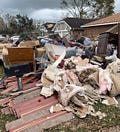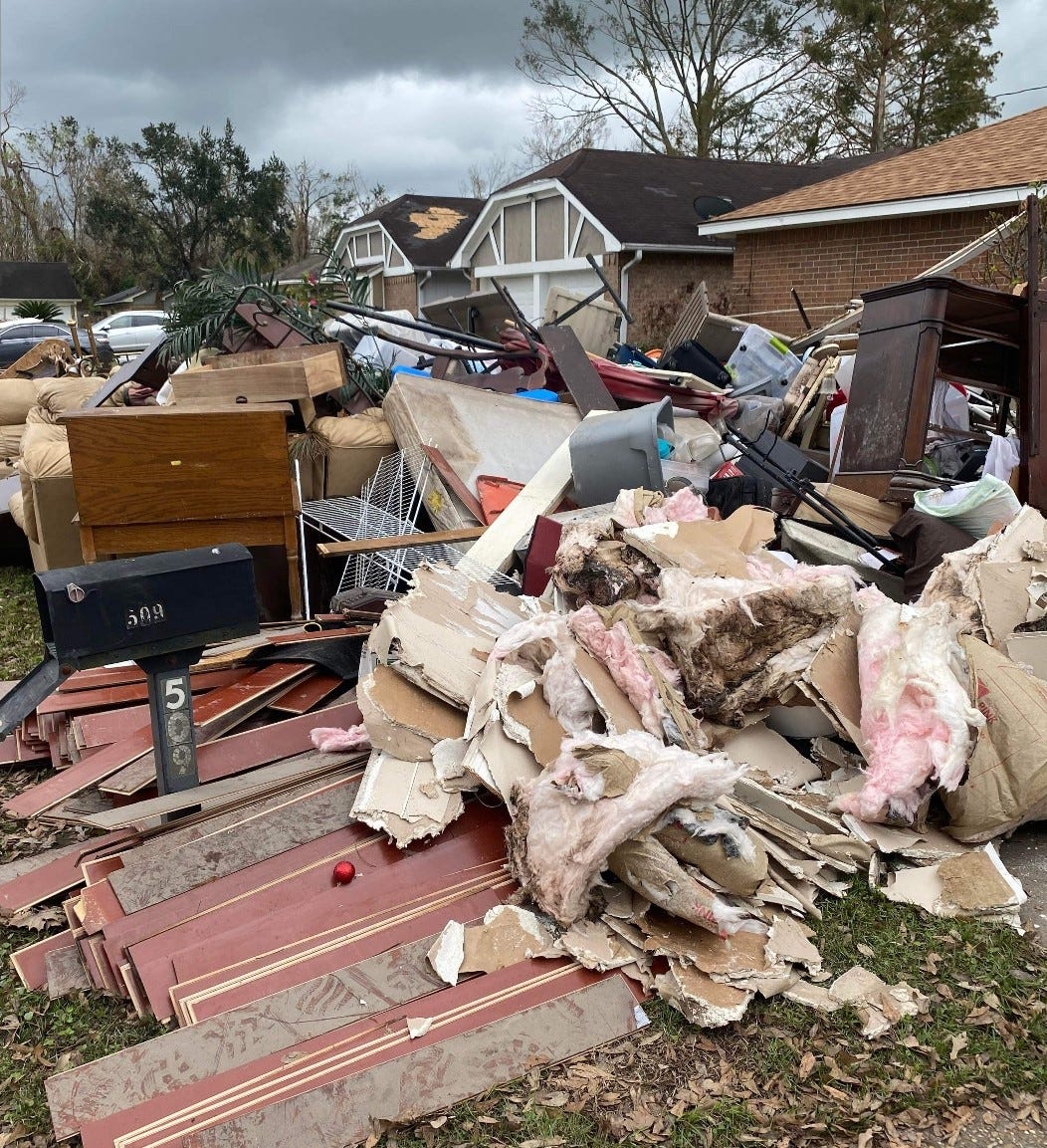Across Louisiana: ICYMI
LaPlace remains mostly uninhabitable for Black residents. Advocates push for fair redistricting. Fathers stop school violence. 'Negro motorists' found safe havens in Baton Rouge, and more ICYMI.
‘We don’t have nowhere to go’ LaPlace residents struggle to rebuild and many can not relocate
Two months after Hurricane Ida made landfall, a predominantly Black community in Louisiana remains devastated by the storm. With their properties destroyed and their lives turned upside-down, the residents of LaPlace are considering the possibility of leaving the place they have known for much of their lives. But most don't have any idea where to go. For families like the Johnsons, the opportunity to move into FEMA trailers is months away while they wait for approval. Until then, their home is gutted and unliveable—and their homeowner’s insurance and FEMA have both denied housing assistance. “My mom is thinking about coming back to Georgia because she is so stressed,” said their daughter Kiera. “It’s just a mess.” Read more from Blavity.
Violent behavior and fights stop at Shreveport, Baton Rouge high schools when fathers arrive
Much like the Security Dads at Glen Oaks High in East Baton Rouge, a group of 40 men calling themselves "Dads on Duty" are walking the halls of Southwood High School in Shreveport. These unofficial guardians volunteer by shifts and welcome students, encourage them, and monitor halls between classes. At both schools, these dads are successfully influencing the high school campuses--a feat Glen Oaks High School’s Security Dads have accomplished for more than 25 continuous years in Baton Rouge. Watch this interview with CBS Evening News, and Dads on Duty. Watch thisinterview by WAFB on Security Dads.
Tour through Baton Rouge reveals safe havens for ‘Negro Motorist’ during Jim Crow era
In a special series called Safe Haven, Louisiana Public Broadcasting host Kara St. Cyr visits historic sites across South Louisiana that enabled Black travelers to move safely through the dangers of Jim Crow and racist attacks. In the latest episode of Safe Haven, St. Cyr visited Scotlandville to meet former State Representative Dalton Honore at the once-prominent Horatio’s Esso Service Station #2. They discuss the importance of service stations in aiding drivers during the civil rights movement. The series is based on "The Negro Motorist Green Book" exhibit by the Smithsonian Institution Traveling Exhibition Service and sponsored by ExxonMobil Baton Rouge. The exhibit is at the Capitol Park Museum until Nov. 14. View the Scotlandville episode on LPB's Facebook page.
Civic groups fight for fair maps as state leaders begin redistricting
Louisiana legislators have begun receiving public opinion and maps from organizations like the ACLU, Power Coalition of Louisiana, and NAACP pushing for a “fair” redesign the state’s legislative and Congressional districts based on significant population shifts. In Caddo and East Baton Rouge parishes, Black people now make up greater shares of the population than in 2010 and are now the plurality. Leaders are also considering how these population shifts impact school districts in East Baton Rouge and the state’s Supreme Court. In several parishes, the shifts were more pronounced. Black residents’ share of the population in Bossier, Ascension, and Livingston Parishes grew between 2 and 4 percentage points. In St. Bernard Parish, that figure increased by 9.4 percentage points. More on redistricting in Louisiana.
Residents vote on four Constitutional amendments, transportation, and judges on Nov. 13
Louisianans will go to the poll on Saturday, Nov. 13 to vote on four Constitutional amendments. Some voters will also decide on city court and family court judges, school board representatives, and public transportation mills renewal. The amendments: (1) authorizes streamlined electronic filing, remittance, and collection of sales and use tax; (2) lowers the maximum allowed rate of income tax and allows providing a deduction for federal income taxes; (3) allows certain levee districts to levy an annual tax for certain purposes; and (4) increases the amount of allowed reduction to certain dedicated funds when a budget deficit is projected. Early voting ends Nov. 6 statewide. Preview your ballot at GeauxVote.
Black Louisiana farmers' land leases are vanishing. Some say racist policies are to blame.
The American Rescue Plan Act of 2021 outlined an effort to address the effects of discrimination in the USDA with a program of debt relief and long-term racial equity work. This effort was halted when a group of white farmers filed a lawsuit claiming reverse discrimination. Gulf States Newsroom reporter Shalina Chatlani visited Iberia Parish and talked with Eddie Lewis III, a fifth-generation sugarcane grower, to learn more from Black farmers and explore the racist policies impacting their livelihood. Read more here: https://bit.ly/3pUXmPM
ACLU Louisiana director tells United Nations and Biden to protect Cancer Alley residents
Alanah Odoms, executive director of the ACLU of Louisiana, delivered a video statement to the United Nations Human Rights Council urging President Joe Biden to protect the health of the mostly Black residents of Louisiana’s River Parishes. Also known as Cancer Alley, the River Parishes were home to more than 350 plantation sites where Blacks labored until their deaths as enslaved people. This sacred land, which the ACLU said should lawfully belong to the descendants of those who were enslaved, has since been invaded by the petrochemical industry while also bearing the brunt of more frequent and severe weather events due to climate change. The ACLU of Louisiana statement was submitted in conjunction with the presentation of a report by the United Nations Working Group of Experts on People of African Descent to the Human Rights Council. The report provides guidance on how to effectively address environmental injustice and presents the impact of the climate crisis and environmental racism on people of African descent.






I think the headline means to say “uninhabitable” not “inhabitable”….still we get the point and something needs to be done.